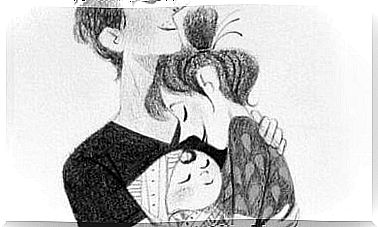8 Signs That You’re An Overprotective Mom

Overprotection is practiced by parents who, sometimes unconsciously, prevent their children from taking over their own lives. It is characterized by making the children run away or not take care of their responsibilities, freedom and experiences specific to each age.
Have you ever wondered if you are an overprotective mom? Analyze these signs and find out!
Remember that your task as a parent should not only focus on protecting your children and avoiding confrontation. It is also necessary to provide tools to face and overcome challenges to be independent and capable people.
Things an overprotective mother does
1.- Try to solve all the children’s problems
When difficulties arise, overprotective mothers quickly take over. They try their best so that their children don’t feel any discomfort.
So that children do not suffer, they do not allow the development of a tolerance for frustration and the ability to solve problems.
2.- Having very frequent contact with the children’s school
Instead of teaching children how to act in a given situation, they seek interventions from others. When there is a problem at school, overprotective parents turn to teachers to solve the problems.
It doesn’t matter if it’s petty, they seek urgency and keep their kids in a bubble.

3.- Do anything to ensure your children succeed at everything
Human beings learn thousands of lessons from mistakes and frustration. However, overprotection prevents children from engaging in activities in which they do not do well.
Again, the intention is good, but the child is being deprived of exploring and developing new skills.
4.- Be extremely condescending when things don’t work out
It’s wonderful when children know how to name emotions and express what they feel. But they also need to learn to deal with sadness, anger and helplessness.
More than anything, for them to feel good, it is necessary to help them to accept what happens and overcome it.
5.- Controlling friendships
People with whom children live in childhood and adolescence can greatly influence their behavior. An overprotective mother will as much as possible prevent children from getting involved with other children if they do not consider them “good”.
Contrary to that, it’s the children who actually have to realize who does it well and who doesn’t. Learning to create healthy interpersonal relationships is another skill that people must develop for themselves.
6.- Being very invasive in the children’s world
Excessively watching what children do turns out to be a little unhealthy. It’s all very well when a mother seeks the welfare of her children, but pushing it to the limit is harmful.
Over time, children will demand intimacy and will begin to build their own lives. It’s a normal thing, part of the maturation process. However, overprotective parents will not respect their children’s limits and rights to keep things secret.

7.- Assign few tasks or responsibilities at home
Cooperation and a sense of belonging to a family are built through discipline. Many children who are overprotected do not really understand the concept of reciprocity or contributing to the functioning of society.
If this happens, children will feel that their own feelings, thoughts and needs should be everyone’s priority.
8.- Disguising the realities of the world
As adults, parents know that in the world there are injustices, evil and unpleasant situations. Children also need to be aware of these dangers and be prepared to overcome them.
Otherwise, they will run the risk of being engulfed by a fierce world for which they were not brought up.
How many of these signs of an overprotective mother can you identify in yourself? Even if you want the best for your child, it is still necessary for him to learn to be prepared for difficult times.
You won’t always be there to help with whatever your child needs. Teach independence and resilience!









